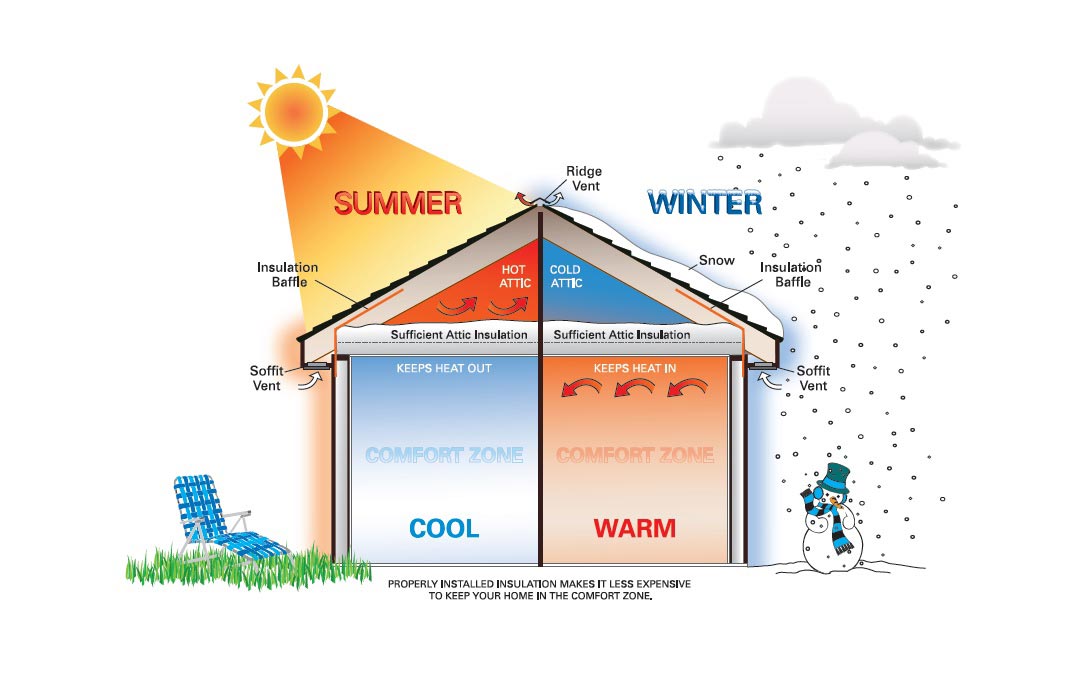Candid Insights
Exploring the latest trends and stories that shape our world.
Insulation: Your Home's Best-Kept Secret for Cozy Living
Unlock the secret to a cozier home! Discover how insulation transforms comfort and reduces energy costs in your living space.
The Benefits of Insulation: Why Your Home Deserves It
Insulation is one of the most effective ways to enhance your home’s energy efficiency. By keeping your home warm in the winter and cool in the summer, it significantly reduces the need for heating and cooling systems to work overtime. This not only lowers energy bills but also minimizes your carbon footprint. Investing in quality insulation can lead to savings of up to 20% on energy costs, making it a wise financial decision for any homeowner.
In addition to its economic benefits, insulation plays a crucial role in providing comfort and improving indoor air quality. It helps to reduce noise pollution from outside, creating a peaceful environment within your home. Furthermore, well-insulated homes are less prone to issues like mold and condensation, as they maintain a consistent temperature and moisture level. By prioritizing insulation, you're not just protecting your investment; you're also enhancing the overall quality of your living space.

How Insulation Works: The Science Behind Cozy Living
Insulation plays a crucial role in maintaining a comfortable indoor environment by reducing heat transfer. How insulation works relies on its ability to resist the flow of heat, which can be classified into three primary methods: conduction, convection, and radiation. Conduction occurs when heat travels through solid materials, convection involves the movement of air, and radiation encompasses heat transfer through infrared energy. By minimizing these heat transfer methods, insulation materials such as fiberglass, foam, and cellulose create a barrier that helps stabilize interior temperatures, providing a cozy living space year-round.
The effectiveness of insulation is measured by its R-value, which indicates its resistance to heat flow. The higher the R-value, the better the material insulates. This is essential for homeowners aiming to enhance energy efficiency and reduce heating and cooling costs. Properly installed insulation not only contributes to a comfortable living environment but also plays a vital role in sustainable living by decreasing energy consumption. As more people recognize the importance of energy efficiency, understanding how insulation works becomes indispensable in creating eco-friendly homes.
Is Your Home Insulated? Top Signs You Need an Upgrade
Proper insulation is crucial for maintaining a comfortable and energy-efficient home. If you're wondering is your home insulated?, there are several signs that may indicate it's time for an upgrade. One of the most telling signs is a noticeable increase in your energy bills, especially during extreme weather seasons. If you find yourself cranking up the thermostat in winter or struggling to cool down in summer despite your HVAC system working overtime, it might be due to inadequate insulation. Additionally, pay attention to drafts; if you feel cold air creeping through windows, doors, or walls, it's a red flag that your insulation may be lacking.
Another sign that your home needs an insulation upgrade is inconsistent temperatures throughout your house. Is your home insulated properly? You might notice certain rooms are significantly hotter or colder than others, which can lead to overall discomfort. Moreover, if you find that your attic or basement feels excessively hot or cold, this can also indicate poor insulation. Lastly, if you hear loud noises from outside, this could signify that your insulation is not adequately soundproofing your space. Take note of these signs, as addressing them sooner rather than later can lead to enhanced comfort and savings on your energy bills.